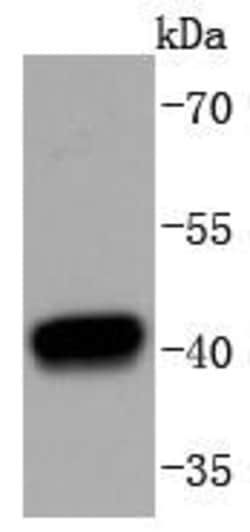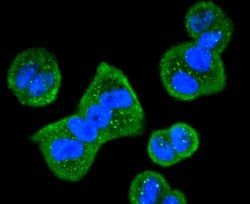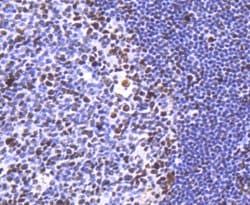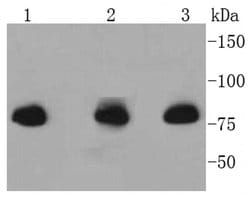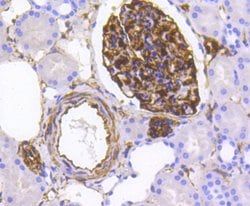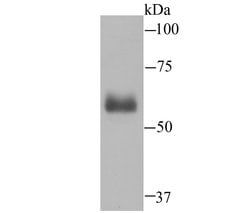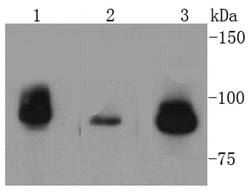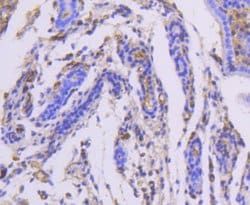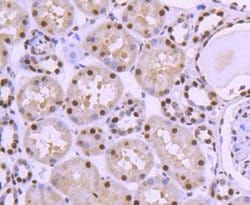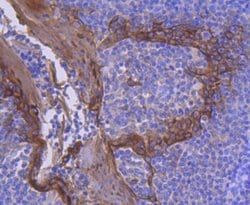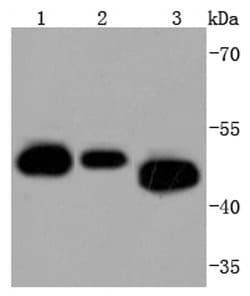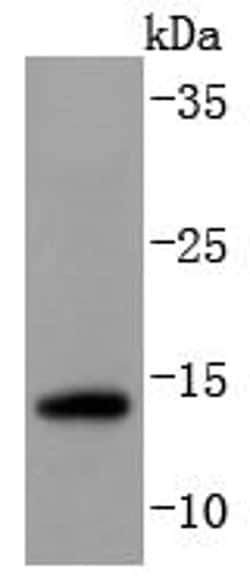PIMA532422
HDAC8 Recombinant Rabbit Monoclonal Antibody (JJ0845), Invitrogen™
Manufacturer: Thermo Scientific
Select a Size
| Pack Size | SKU | Availability | Price |
|---|---|---|---|
| Each of 1 | PIMA532422-Each-of-1 | In Stock | ₹ 47,481.50 |
PIMA532422 - Each of 1
In Stock
Quantity
1
Base Price: ₹ 47,481.50
GST (18%): ₹ 8,546.67
Total Price: ₹ 56,028.17
Antigen
HDAC8
Classification
Monoclonal
Concentration
1 mg/mL
Formulation
TBS with 0.05% BSA, 40% Glycerol and 0.05% sodium azide, pH 7.4
Gene Accession No.
Q9BY41
Gene Symbols
HDAC8
Immunogen
Synthetic peptide within Human HDAC8 aa 51-100
Quantity
100 μL
Primary or Secondary
Primary
Target Species
Human
Product Type
Antibody
Isotype
IgG
Applications
Flow Cytometry, Immunocytochemistry, Immunohistochemistry, Western Blot, Western Blot
Clone
JJ0845
Conjugate
Unconjugated
Gene
HDAC8
Gene Alias
2610007D20Rik, CDA07, CDLS5, HD8, Hdac8, HDACL1, histone deacetylase 8, histone deacetylase-like 1, MRXS6, RGD1562895, RPD3, WTS
Host Species
Rabbit
Purification Method
Protein A
Regulatory Status
RUO
Gene ID (Entrez)
55869
Content And Storage
Store at 4°C short term. For long term storage, store at -20°C, avoiding freeze/thaw cycles.
Form
Liquid
Description
- Recombinant rabbit monoclonal antibodies are produced using in vitro expression systems
- The expression systems are developed by cloning in the specific antibody DNA sequences from immunoreactive rabbits
- Then, individual clones are screened to select the best candidates for production
- The advantages of using recombinant rabbit monoclonal antibodies include: better specificity and sensitivity, lot-to-lot consistency, animal origin-free formulations, and broader immunoreactivity to diverse targets due to larger rabbit immune repertoire
- In the intact cell, DNA closely associates with histones and other nuclear proteins to form chromatin
- The remodeling of chromatin is believed to be a critical component of transcriptional regulation and a major source of this remodeling is brought about by the acetylation of nucleosomal histones
- Acetylation of lysine residues in the amino terminal tail domain of histone results in an allosteric change in the nucleosomal conformation and an increased accessibility to transcription factors by DNA
- Conversely, the deacetylation of histones is associated with transcriptional silencing
- Several mammalian proteins have been identified as nuclear histone acetylases, including GCN5, PCAF (p300/CBP-associated factor), p300/CBP, HAT1 and the TFIID subunit TAF II p250
- Mammalian HDAC8, isolated from human kidney, is a histone deacetylase that shares homology to other HDACs but has different tissue distribution
- HDAC8 is localized to the nucleus and plays a role in the development of a broad range of tissues and in the etiology of cancer.
Compare Similar Items
Show Difference
Antigen: HDAC8
Classification: Monoclonal
Concentration: 1 mg/mL
Formulation: TBS with 0.05% BSA, 40% Glycerol and 0.05% sodium azide, pH 7.4
Gene Accession No.: Q9BY41
Gene Symbols: HDAC8
Immunogen: Synthetic peptide within Human HDAC8 aa 51-100
Quantity: 100 μL
Primary or Secondary: Primary
Target Species: Human
Product Type: Antibody
Isotype: IgG
Applications: Flow Cytometry, Immunocytochemistry, Immunohistochemistry, Western Blot, Western Blot
Clone: JJ0845
Conjugate: Unconjugated
Gene: HDAC8
Gene Alias: 2610007D20Rik, CDA07, CDLS5, HD8, Hdac8, HDACL1, histone deacetylase 8, histone deacetylase-like 1, MRXS6, RGD1562895, RPD3, WTS
Host Species: Rabbit
Purification Method: Protein A
Regulatory Status: RUO
Gene ID (Entrez): 55869
Content And Storage: Store at 4°C short term. For long term storage, store at -20°C, avoiding freeze/thaw cycles.
Form: Liquid
Antigen:
HDAC8
Classification:
Monoclonal
Concentration:
1 mg/mL
Formulation:
TBS with 0.05% BSA, 40% Glycerol and 0.05% sodium azide, pH 7.4
Gene Accession No.:
Q9BY41
Gene Symbols:
HDAC8
Immunogen:
Synthetic peptide within Human HDAC8 aa 51-100
Quantity:
100 μL
Primary or Secondary:
Primary
Target Species:
Human
Product Type:
Antibody
Isotype:
IgG
Applications:
Flow Cytometry, Immunocytochemistry, Immunohistochemistry, Western Blot, Western Blot
Clone:
JJ0845
Conjugate:
Unconjugated
Gene:
HDAC8
Gene Alias:
2610007D20Rik, CDA07, CDLS5, HD8, Hdac8, HDACL1, histone deacetylase 8, histone deacetylase-like 1, MRXS6, RGD1562895, RPD3, WTS
Host Species:
Rabbit
Purification Method:
Protein A
Regulatory Status:
RUO
Gene ID (Entrez):
55869
Content And Storage:
Store at 4°C short term. For long term storage, store at -20°C, avoiding freeze/thaw cycles.
Form:
Liquid
Antigen: Cytokeratin 2e
Classification: Monoclonal
Concentration: 1 mg/mL
Formulation: TBS with 0.05% BSA, 40% Glycerol and 0.05% sodium azide, pH 7.4
Gene Accession No.: P35908
Gene Symbols: KRT2
Immunogen: Recombinant protein within Human Cytokeratin 2e aa 273-442
Quantity: 100 μL
Primary or Secondary: Primary
Target Species: Human
Product Type: Antibody
Isotype: IgG
Applications: Immunohistochemistry, Western Blot
Clone: JJ201-8
Conjugate: Unconjugated
Gene: KRT2
Gene Alias: BB005427, CK 2e, CK-2e, Cytokeratin-2e, epithelial keratin-2e, K2e, Kb2, keratin 2, keratin 2 epidermis, keratin 2, type II, keratin 2e, keratin complex 2, basic, gene 17, keratin complex 2, gene 17, keratin, type II cytoskeletal 2 epidermal, Keratin-2 epidermis, keratin-2e, KRT2, krt2 {ECO:0000250, Krt2-17, Krt2-2, KRT2A, Krt2e, KRTE, MGC116967, MGC116968, type II keratin Kb2, type-II keratin Kb2, UniProtKB:P35908}
Host Species: Rabbit
Purification Method: Protein A
Regulatory Status: RUO
Gene ID (Entrez): 3849
Content And Storage: Store at 4°C short term. For long term storage, store at -20°C, avoiding freeze/thaw cycles.
Form: Liquid
Antigen:
Cytokeratin 2e
Classification:
Monoclonal
Concentration:
1 mg/mL
Formulation:
TBS with 0.05% BSA, 40% Glycerol and 0.05% sodium azide, pH 7.4
Gene Accession No.:
P35908
Gene Symbols:
KRT2
Immunogen:
Recombinant protein within Human Cytokeratin 2e aa 273-442
Quantity:
100 μL
Primary or Secondary:
Primary
Target Species:
Human
Product Type:
Antibody
Isotype:
IgG
Applications:
Immunohistochemistry, Western Blot
Clone:
JJ201-8
Conjugate:
Unconjugated
Gene:
KRT2
Gene Alias:
BB005427, CK 2e, CK-2e, Cytokeratin-2e, epithelial keratin-2e, K2e, Kb2, keratin 2, keratin 2 epidermis, keratin 2, type II, keratin 2e, keratin complex 2, basic, gene 17, keratin complex 2, gene 17, keratin, type II cytoskeletal 2 epidermal, Keratin-2 epidermis, keratin-2e, KRT2, krt2 {ECO:0000250, Krt2-17, Krt2-2, KRT2A, Krt2e, KRTE, MGC116967, MGC116968, type II keratin Kb2, type-II keratin Kb2, UniProtKB:P35908}
Host Species:
Rabbit
Purification Method:
Protein A
Regulatory Status:
RUO
Gene ID (Entrez):
3849
Content And Storage:
Store at 4°C short term. For long term storage, store at -20°C, avoiding freeze/thaw cycles.
Form:
Liquid
Antigen: Cdc37
Classification: Monoclonal
Concentration: 1 mg/mL
Formulation: TBS with 0.05% BSA, 40% Glycerol and 0.05% sodium azide, pH 7.4
Gene Accession No.: Q16543, Q61081, Q63692
Gene Symbols: CDC37
Immunogen: Synthetic peptide within Human Cdc37 aa 1-50
Quantity: 100 μL
Primary or Secondary: Primary
Target Species: Human, Mouse, Rat
Product Type: Antibody
Isotype: IgG
Applications: Flow Cytometry, Immunohistochemistry, Western Blot
Clone: JJ087-06
Conjugate: Unconjugated
Gene: CDC37
Gene Alias: CDC 37, CDC37, CDC37 (cell division cycle 37 S. cerevisiae homolog), CDC37 (cell division cycle 37, S. cerevisiae, homolog), CDC37 cell division cycle 37 homolog, Cdc37 homolog, CDC37 protein, CDC37A, Cdc37p, Cell division control protein 37, cell division cycle 37, cell division cycle 37 homolog, hsp90 chaperone protein kinase-targeting subunit, Hsp90 co-chaperone Cdc37, Hsp90 co-chaperone Cdc37, N-terminally processed, p50, P50CDC37, SMO1, YD9489.03, YDR168W
Host Species: Rabbit
Purification Method: Protein A
Regulatory Status: RUO
Gene ID (Entrez): 11140, 114562, 12539
Content And Storage: Store at 4°C short term. For long term storage, store at -20°C, avoiding freeze/thaw cycles.
Form: Liquid
Antigen:
Cdc37
Classification:
Monoclonal
Concentration:
1 mg/mL
Formulation:
TBS with 0.05% BSA, 40% Glycerol and 0.05% sodium azide, pH 7.4
Gene Accession No.:
Q16543, Q61081, Q63692
Gene Symbols:
CDC37
Immunogen:
Synthetic peptide within Human Cdc37 aa 1-50
Quantity:
100 μL
Primary or Secondary:
Primary
Target Species:
Human, Mouse, Rat
Product Type:
Antibody
Isotype:
IgG
Applications:
Flow Cytometry, Immunohistochemistry, Western Blot
Clone:
JJ087-06
Conjugate:
Unconjugated
Gene:
CDC37
Gene Alias:
CDC 37, CDC37, CDC37 (cell division cycle 37 S. cerevisiae homolog), CDC37 (cell division cycle 37, S. cerevisiae, homolog), CDC37 cell division cycle 37 homolog, Cdc37 homolog, CDC37 protein, CDC37A, Cdc37p, Cell division control protein 37, cell division cycle 37, cell division cycle 37 homolog, hsp90 chaperone protein kinase-targeting subunit, Hsp90 co-chaperone Cdc37, Hsp90 co-chaperone Cdc37, N-terminally processed, p50, P50CDC37, SMO1, YD9489.03, YDR168W
Host Species:
Rabbit
Purification Method:
Protein A
Regulatory Status:
RUO
Gene ID (Entrez):
11140, 114562, 12539
Content And Storage:
Store at 4°C short term. For long term storage, store at -20°C, avoiding freeze/thaw cycles.
Form:
Liquid
Antigen: SUMO2/SUMO3
Classification: Monoclonal
Concentration: 1 mg/mL
Formulation: TBS with 0.05% BSA, 40% Glycerol and 0.05% sodium azide, pH 7.4
Gene Accession No.: P55854, P61956, P61957, P61959, Q5XIF4, Q9Z172
Gene Symbols: SUMO2, Sumo3
Immunogen: Synthetic peptide within Human Sumo 3 aa 11-60
Quantity: 100 μL
Primary or Secondary: Primary
Target Species: Human, Mouse, Rat
Product Type: Antibody
Isotype: IgG
Applications: Immunocytochemistry, Immunohistochemistry, Western Blot, Western Blot
Clone: JJ087-04
Conjugate: Unconjugated
Gene: SUMO2
Gene Alias: 2810014B19Rik, D10Ertd345e, GMP1, HSMT3, I79_000932, MIF2 suppressor, Sentrin, sentrin 2, sentrin-2, small ubiquitin-like modifier 2, small ubiquitin-like modifier 3, small ubiquitin-like modifier 3 L homeolog, small ubiquitin-related modifier 2, Small ubiquitin-related modifier 3, Smt3, SMT3 (supressor of mif two, 3) homolog 1, SMT3 homolog 1, SMT3 homolog 2, SMT3 homolog 3, SMT3 suppressor of mif two 3 homolog 1, SMT3 suppressor of mif two 3 homolog 2, SMT3 suppressor of mif two 3 homolog 2 (yeast), SMT3 suppressor of mif two 3 homolog 3, SMT3 suppressor of mif two 3 homolog 3 (yeast), SMT3 supressor of mif two 3 homolog 2, SMT3A, Smt3B, SMT3C, SMT3H1, SMT3H2, SMT3H3, SUMO-1, SUMO2, SUMO-2, Sumo3, SUMO-3, sumo3.L, Ubiquitin-like protein SMT3A, ubiquitin-like protein SMT3B, UBL1
Host Species: Rabbit
Purification Method: Protein A
Regulatory Status: RUO
Gene ID (Entrez): 170930, 20610, 499417, 6612, 6613, 690244
Content And Storage: Store at 4°C short term. For long term storage, store at -20°C, avoiding freeze/thaw cycles.
Form: Liquid
Antigen:
SUMO2/SUMO3
Classification:
Monoclonal
Concentration:
1 mg/mL
Formulation:
TBS with 0.05% BSA, 40% Glycerol and 0.05% sodium azide, pH 7.4
Gene Accession No.:
P55854, P61956, P61957, P61959, Q5XIF4, Q9Z172
Gene Symbols:
SUMO2, Sumo3
Immunogen:
Synthetic peptide within Human Sumo 3 aa 11-60
Quantity:
100 μL
Primary or Secondary:
Primary
Target Species:
Human, Mouse, Rat
Product Type:
Antibody
Isotype:
IgG
Applications:
Immunocytochemistry, Immunohistochemistry, Western Blot, Western Blot
Clone:
JJ087-04
Conjugate:
Unconjugated
Gene:
SUMO2
Gene Alias:
2810014B19Rik, D10Ertd345e, GMP1, HSMT3, I79_000932, MIF2 suppressor, Sentrin, sentrin 2, sentrin-2, small ubiquitin-like modifier 2, small ubiquitin-like modifier 3, small ubiquitin-like modifier 3 L homeolog, small ubiquitin-related modifier 2, Small ubiquitin-related modifier 3, Smt3, SMT3 (supressor of mif two, 3) homolog 1, SMT3 homolog 1, SMT3 homolog 2, SMT3 homolog 3, SMT3 suppressor of mif two 3 homolog 1, SMT3 suppressor of mif two 3 homolog 2, SMT3 suppressor of mif two 3 homolog 2 (yeast), SMT3 suppressor of mif two 3 homolog 3, SMT3 suppressor of mif two 3 homolog 3 (yeast), SMT3 supressor of mif two 3 homolog 2, SMT3A, Smt3B, SMT3C, SMT3H1, SMT3H2, SMT3H3, SUMO-1, SUMO2, SUMO-2, Sumo3, SUMO-3, sumo3.L, Ubiquitin-like protein SMT3A, ubiquitin-like protein SMT3B, UBL1
Host Species:
Rabbit
Purification Method:
Protein A
Regulatory Status:
RUO
Gene ID (Entrez):
170930, 20610, 499417, 6612, 6613, 690244
Content And Storage:
Store at 4°C short term. For long term storage, store at -20°C, avoiding freeze/thaw cycles.
Form:
Liquid
